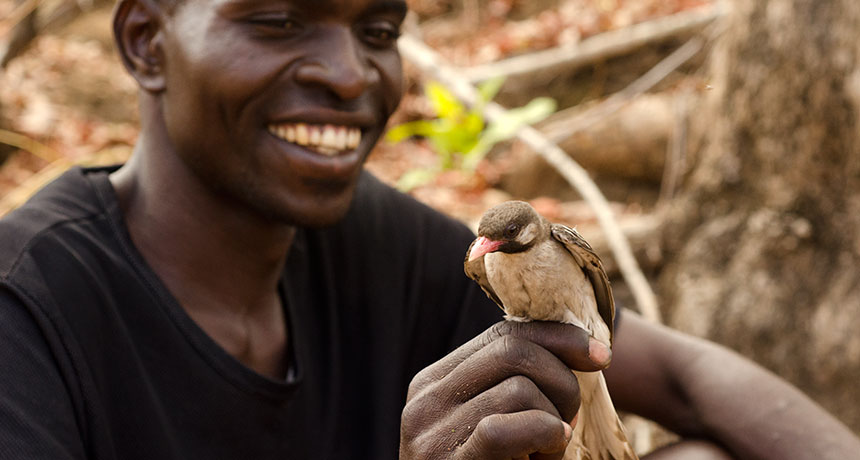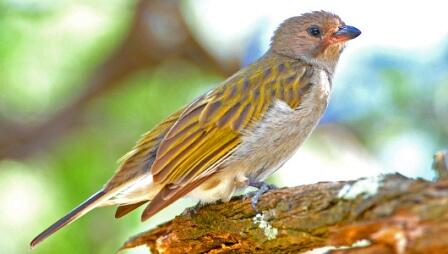Usually, domesticated animals communicate with humans, but this article is about how honey-guides communicate with humans, especially in Africa.
According to a study in the journal Science, “African honey-guide birds are known to regularly lead human honey-hunters to bee colonies, and the humans, on opening up the nest, leave enough mess for the birds to feast on”.
The journal adds that Spottiswoode et al.show that when the honey-hunters make a specific call, honey-guides are both more likely to come to their aid and more likely to find them a bee’s nest. This interaction suggests that the birds are able to attach a specific meaning of cooperation to the human’s call—a rare case of mutualism between humans and a wild animal.
BBC mentioned that experiments conducted in the savannah of Mozambique showed that a successful bird-assisted hunt was much more likely in the presence of a distinctive, trilling shout that the Yao hunters of this region learn from their fathers.
“They told us that the reason they make this ‘brrrr-hm’ sound, when they’re walking through the bush looking for bees’ nests, is that it’s the best way of attracting a honeyguide – and of maintaining a honeyguide’s attention once it starts guiding you,” said Dr Claire Spottiswoode, a researcher at the University of Cambridge, UK, and the University of Cape Town, South Africa, who led the study.
She and her colleagues wanted to test what contribution this sound actually made. They particularly wanted to see whether honeyguides responded to the specific information content of the ‘brrr-hm’ call – which, from a honeyguide’s point of view, effectively signals ‘I’m looking for bees’ nests’ – or whether the call simply alerts honeyguides to the presence of humans in the environment, according to the researcher.
To make that distinction, the team made recordings of the “brrrr-hm” call, as well as of general human vocal sounds such as the hunters shouting their own names, or the Yao word for “honey”.
Then, Dr Spottiswoode accompanied two Yao honey hunters on 72 separate 15-minute walks through the Niassa National Reserve – a protected area the size of Denmark – playing these recordings on a speaker.
Sure enough, walks accompanied by the “brrrr-hm” recordings were much more likely to recruit a honeyguide (66% of the time, compared to 25% for the other vocal sounds).
The special call also trebled the overall chance of finding a beehive (a 54% success rate, up from 17% for the other sounds).
“What this suggests is that honeyguides are attaching meaning, and responding appropriately, to the signal that advertises people’s willingness to cooperate.
“We already knew very well… that honeyguides communicate with humans, using special calls and behaviour to lead honey hunters to bees’ nests. What our work has done is to complement those findings, by showing that humans communicate back to honeyguides too.
“It seems to be a two-way conversation between our own species and a wild animal, from which both partners benefit.”
https://www.youtube.com/watch?v=ruvwXgcIhX0
About Honey Guides
- Honeyguides (family Indicatoridae) are near passerine bird species of the order Piciformes
- They are also known as indicator birds, or honey birds
- They have an Old Worldtropical distribution, with the greatest number of species in Africa and two in Asia
- These birds are best known for their interaction with humans
- Honeyguides are noted and named for one or two species that will deliberately lead humans (but, contrary to popular claims, nothoney badgers) directly to bee colonies, so that they can feast on the grubs and beeswax that are left behind












